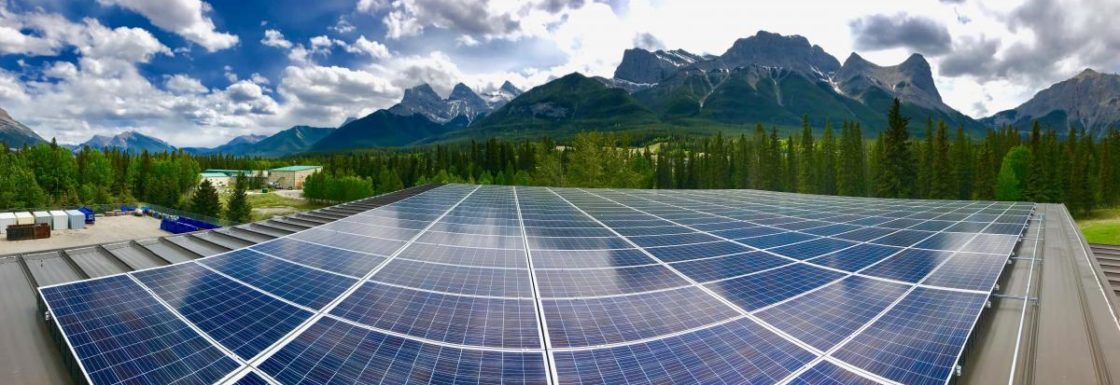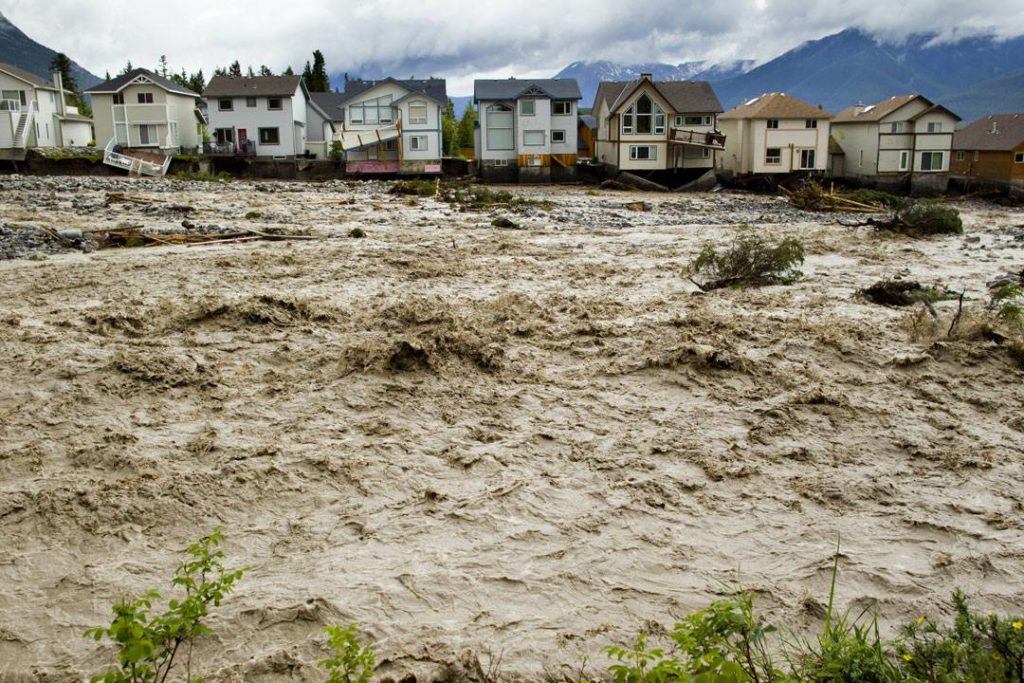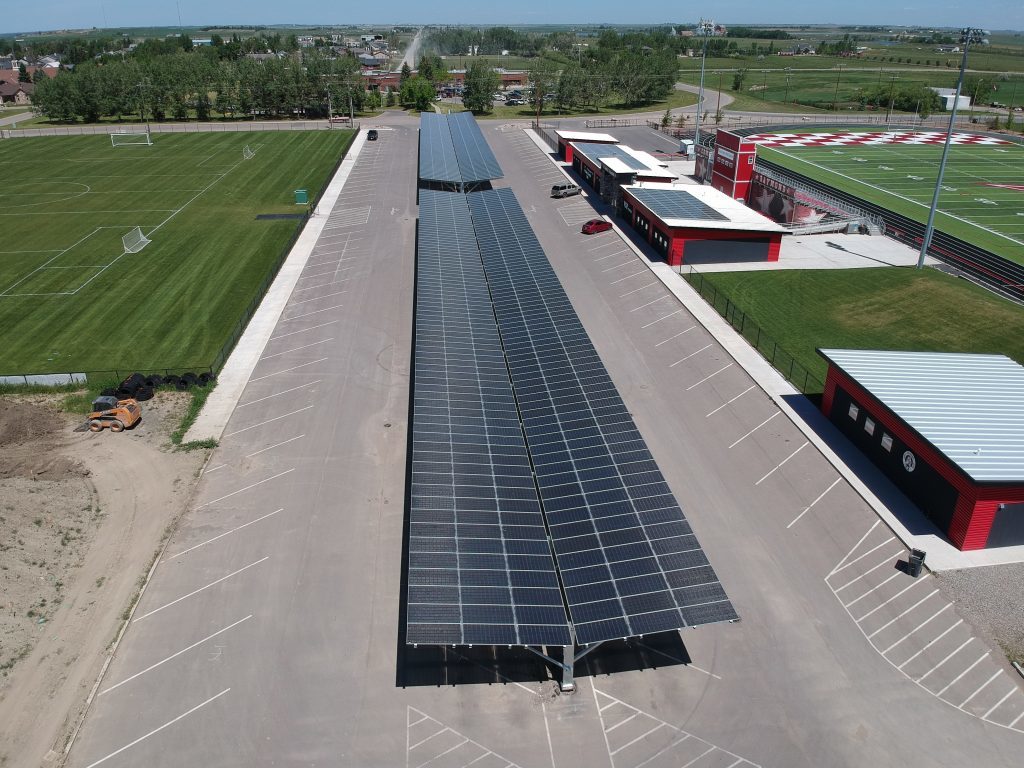Climate Action in Albertan Municipalities? It’s Electrifying!


Trina Innes describes the meaningful role that municipalities play in advancing climate action, illustrated through the success and impacts of Alberta’s Municipal Climate Change Action Centre programs.
Climate change is a major, defining challenge around the world. More than 400 municipalities across Canada have declared a climate emergency and there is an increasing recognition that transitioning to a low carbon and energy-efficient future is necessary. Having experienced the impacts of climate change first-hand, including severe weather events like hail, flooding, wildfires, wind storms and drought, municipalities of all sizes are also recognizing the crucial contributions they can make to climate change action.
Municipalities are also experiencing financial burdens as their operating and maintenance costs increase to deal with climate extremes that directly affect capital assets, operations and services – water supply, stormwater management, waste management, roads, office buildings, recreation facilities and housing. With smart investing, municipalities have the opportunity to invest in reducing greenhouse gas emissions, improving energy efficiency, reducing costs, and realizing many co-benefits like energy security and affordability, green jobs, reduced air pollution, and community resilience.

In mid-2018, I was recruited to lead the Municipal Climate Change Action Centre (MCCAC), an alliance between the Alberta Urban Municipalities Association, the Rural Municipalities of Alberta and the Government of Alberta. Based in Edmonton, the MCCAC helps Alberta’s municipalities transition to a low-carbon future by providing funding, technical assistance and education. In its first 9 years of operation, the MCCAC invested approximately $12 million in helping Alberta municipalities to take action on climate change mitigation. In recognition of its past success, in 2018 the Government of Alberta awarded MCCAC’s $54 million to design, launch and implement a suite of renewable energy and energy efficiency programs for rural and urban municipalities.
My small team of two early-career professionals was grown to a team of seven. Together we explored the situation facing Alberta municipalities and began framing initiatives to meet their needs. We learned there is:
- Varying levels of belief in and support for action on climate change in elected officials, municipal administration and residents.
- Recognition that while the clean energy transition is a priority for over half of municipalities, almost half have no energy-related plans.
- Limited internal understanding of how much energy municipalities use or how much they can reduce consumption.
- Mixed exposure to climate change planning, energy management plans, and identifying or implementing climate action measures.
- Lack of skilled staff, time, and budget to lead climate change action programs.
- Bias towards short-term investment decisions with immediate returns versus investments that have longer-term paybacks.
- Competing priorities that require attention including modernizing water and transportation infrastructure, improving urban design among others.
- A belief that they are “too small” to have an impact, realize benefits or make a contribution to climate change action.
Keeping different priorities, lack of information and capacity barriers in mind, my team further engaged with energy consulting firms, provincial government experts, and municipal representatives to build eight programs to transition municipalities towards a low-carbon future. These include programs for electric vehicles, solar photovoltaic systems, energy efficiency upgrades in recreation facilities, community generation capacity building and capital projects, and on-site energy manager programs.
We addressed the challenges facing municipalities in a number of ways. Variations in regional interests and capabilities were addressed by aligning with municipal priorities like ageing recreational facilities and growing interest in electric vehicles. Challenges regarding skills and time were addressed by designing simple applications, flexible intake schedules and supporting feasibility studies so municipalities could bring in the experts. We made programs more attractive to new or under-resourced municipalities by adding a first-time applicant bonus and an Energy Manager Program. We encouraged municipalities to partner with smaller neighbouring municipalities on the Energy Manager Program to broaden the program’s impact and knowledge transfer opportunities. Finally, we developed an energy and climate change advisory service to provide assistance to smaller, under-resourced municipalities.
All of this work has paid off. MCCAC’s programs have resulted in positive climate action impacts in Albertan municipalities, including the following:
City of Airdrie
As part of the Alberta Municipal Solar Program, the City of Airdrie unveiled Canada’s largest municipal rooftop solar field consisting of 3,800 modules mounted atop their Genesis Place Recreation Centre. The $2.8 million, 1.55-megawatt system was made possible through funding from the Municipal Climate Change Action Centre, leveraged the Federal Gas Tax Fund and a provincial utility company. The installation will provide power for up to 30% of electricity needs at the facility and generate up to $80,000 per year in avoided energy bills.

Town of Raymond
As part of the Alberta Municipal Solar Program, the Town of Raymond has installed modules on most of the town’s facilities, including the firehall, ice arena, golf course and water treatment plant. The solar energy generated will cover all of the electricity as required to run town operations including buildings and street lights. This makes them the first electrically net-zero municipality in Canada.

City of Medicine Hat
As part of the Electric Vehicles for Municipalities program, the City of Medicine Hat is purchasing two electric ice resurfacers for use at the Canalta Centre, home of the Medicine Hat Tigers hockey team. As the city’s first electric vehicles these machines eliminate the use of internal combustion engines. This reduces greenhouse gas emissions and improves the health and safety of hockey fans.

Municipal District of Bonnyville, the City of Cold Lake and the Village of Glendon
As part of the Municipal Energy Manager Program, these three municipalities have partnered to share a municipal manager and identify strategies for managing energy in 84 facilities generating benefits for their 27,000 urban and rural residents.
While every municipality is unique, most municipalities of any size can take advantage of MCCAC programs to enhance their buildings and infrastructure. The MCCAC works to lead and partner with others on initiatives to:
Make energy efficiency and renewable energy visible.
It is difficult to directly observe climate change. Making information available about the impacts of action on energy efficiency and renewable energy visible, and the co-benefits of taking action will encourage municipalities to act. The lack of awareness and knowledge about climate change stretches into other areas connected to municipal operations like planning and risk management. Climate change mitigation and adaptation strategies need to be integrated into community design and enterprise risk management systems.
Encourage inventories of energy use.
Energy management is about using energy better and involves both consumption and production. Understanding energy use will help municipalities identify where there are opportunities for savings. Energy efficiency is a very safe financial investment as its return on investment is almost guaranteed and the returns are relatively predictable. When municipalities work with energy efficiency top-of-mind, they can install energy conservation measures at the same time as addressing deferred maintenance issues.
Build awareness of the Partners for Climate Protection (PCP).
The PCP program, from ICLEI Canada and the Federation of Canadian Municipalities, is a free program open to all Canadian municipalities. It offers a five-step Milestone Framework that guides participants in taking action against climate change. Regional climate advisors are located across Canada to help municipalities move through the framework. This is a great way for municipalities to get started.
Advance collaboration and connections to opportunities.
With over 436,000 energy efficiency workers across Canada, there are many people to collaborate with to advance work in this space. Natural Resources Canada maintains a hub to share information about grants and other programs available across Canada. Increasingly, energy companies are offering financing products for energy efficiency and renewable energy solutions. In April 2019, the Federation of Canadian Municipalities received $1B intended to fund up to 500 smaller and rural municipalities and their sustainability initiatives, including eco-efficiency.
Local governments can set an example by improving energy efficiency and renewable energy use in their facilities and operations. This work exemplifies responsible stewardship of tax dollars in facilities that are frequently visited by the public like recreation centres, libraries and city halls. It also showcases how the application of energy conservation and energy generation measures can make a positive impact and generate savings that can be invested in other programs and services.
Interested in finding out more about programs offered by the Municipal Climate Change Action Centre? Visit https://mccac.ca/.














